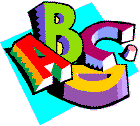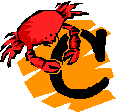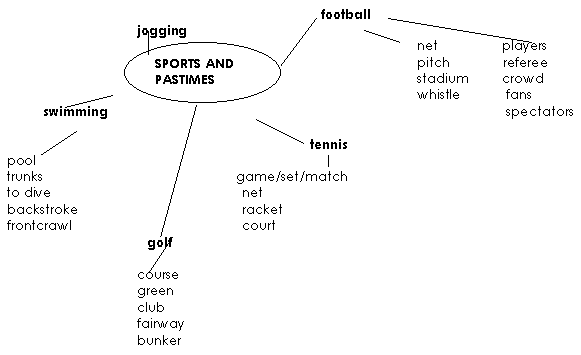...inicio...
Presentación
CURSO de Aprendizaje
Gramática
Listening
Libros
Lecturas
Programas
Ejercicios
Práctica
Recursos
y Actividades
Vocabulario
Teachers
First Certificate
Enlaces
Tablón de Anuncios
Servicios
Chat
Diccionario
Traducción
| Ahora
puedes tener La Mansión del Inglés en CD Rom |
| - ··· - |
| Consigue más de 150 programas Freeware y Shareware para mejorar tu Inglés |


Teaching Vocabulary (3)
(by Craig Wealand)
1. Pellmanism
Two sets of cards for each group. One set with pictures of objects, the other with the word written (with phonetics, or maybe only phonetics).
Place the cards face down and mix them up. Each S can turn over two cards. If they match (e.g. the picture of a tree and the word ‘tree’), the S keeps both cards. If they don’t he/she turns them over again to the blank side, leaving them in exactly the same place on the table.
The idea as the game progresses is to remember the position of the pictures and the words. SS only have two chances to turn cards over each time.
The winner is the lucky S who has the most cards at the end.
This also works well with collocation, matching verbs and nouns, for example:-
Answer the phone
Make a reservation
Pull your leg
Tell a joke
2. Verbal Gap Fill
Read a familiar text to the SS out loud ( maybe a text they should have read for homework, or a written gap fill they did last lesson ). Stop periodically and tell SS to shout out (all at the same time) which word they think is missing. Encourage words which are not in the text but could possible ‘fit’.
Note
:- This can be done ‘on the spot’, but it pays to go through the text quickly before the lesson and target the vocab. you’re going to omit.3. Nonsense Words
If the following words existed, what do you think they’d mean?
reget; Cecardback, excessage; sublunar; bidaily; punkly; postthink; Impossibiate; disrecommend; attendive.
What parts of speech (noun? adjective? verb?) would they be?
Sensitise SS to parts of speech and context clues by substituting real vocab. for nonsense words. Some examples :-
A Did you have to
ding him so hard?B Well, he smashed into my car!
A Did anybody call the
bonderfut?B No, I drove away
spankly.4. L1 Translation
If all your SS have a language in common apart from English, and you know it too, why not play with it.
How do words translate into Ss language? Let them laugh at your pronunciation, it may make them feel better about pronouncing English, and it may make the words memorable.
Do the words have the same collocation in theirL1?
What about false friends?
If a S asks you to translate a word from L1 to English, ask the class if you don’t know (or even if you do) before turning to a dictionary.
Are there any contextual or collocation clues to help guess the meaning before using translation?
Is the preposition the same in L1?
5. “But How Can I Remember New Words?”
Try this little test. Study the following list of words for about a minute, then turn away from the screen and write down on paper all the words you can remember.
| Oil death dolphin triangle circus stool shark Peach whale nose pickle fortnight cloud stream Lovely-jubly mountain square stapler breeze bush Button valley circle crab onion grass |
Did you remember the first word ‘oil’ and the last word ‘grass’?
We often remember the information we hear first and last.
What about ‘lovely-jubly’?
It’s unusual, and therefore sticks in the mind.
Did you write your words in groups?
Fish together, shapes together, nature words together?
Did you write words that were not in the box?
We tend to group words together and make associations and connections to help us remember.
It’s a good idea to find out how your SS learn new words, and if they use particular techniques or systems for recording and learning new words. Here are some ideas :-
Mind Maps :-

Grouping By Lists :-
| Jobs | Travel | Food |
| A teacher | Boat | To do the shopping |
| A footballer | jet ski | To make a cake/sandwich/cup of tea |
| A taxi driver | raft | To grill |
| To earn a salary | canoe | a cook/chef |
| To do shift work | to row | a gas/electric cooker |
Note :- Encourage SS to mark word stress.
Ss could use one colour for verbs, another for nouns, another for adjectives etc.
Tables For Wordbuilding :-
|
BASE |
NOUN |
ADJECTIVE |
VERB |
ADVERB |
|
Danger |
Danger |
Dangerous |
To endanger |
dangerously |
|
Safe |
Safety |
Safe/to make safe |
To save |
safely |
Insight Pictures :-
Represent the characteristic of a word by the way you write it.

SS could draw a word in any way they imagine it. Personalising vocab. in this way should help SS to remember.
Memory Pictures And Word Association :-
Does the sound of a word remind the SS of a word in their language?
The Spanish word ‘mesa’ (table) reminds me of a big mess. I imagine a mess on top of a table and this helps me to remember.
To remember the Italian word ‘topo’, (rat) I picture a rat on ‘top of’ a house.
The sillier the better, and the more personal the association, chances are the better the word will stick.
If you’ve found this list useful, please send us your classroom ideas. If they’re any good, we’ll put them on the web page and share them with the world!
Craig Wealand
© Copyright 2001 Craig Wealand & Domingo Blanco - Todos los Derechos Reservados. -
